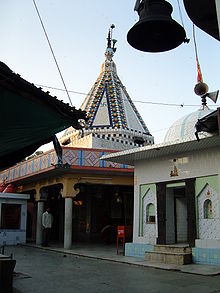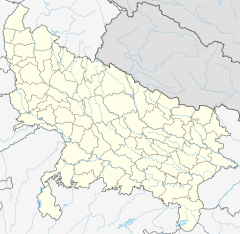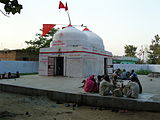| This article needs additional citations for verification. Please help improve this article by adding citations to reliable sources. Unsourced material may be challenged and removed. Find sources: "Gola Gokaran Nath Temple" – news · newspapers · books · scholar · JSTOR (September 2014) (Learn how and when to remove this message) |
| Gola Gokaran Nath Temple | |
|---|---|
 Shiva Temple (शिव मन्दिर), Gola Shiva Temple (शिव मन्दिर), Gola | |
| Religion | |
| Affiliation | Hinduism |
| District | lakhimpur |
| Deity | Lord Shiva (भगवान् शिव) |
| Festivals | Maha Shivratri, Sawan Month |
| Location | |
| Location | Gola Gokaran Nath (गोला गोकर्ण नाथ, उत्तर प्रदेश) |
| State | Uttar Pradesh |
| Country | India |
  | |
| Geographic coordinates | 28°08′N 80°46′E / 28.13°N 80.76°E / 28.13; 80.76 |
| Architecture | |
| Type | North Indian Style |
Gola Gokaran Nath Temple is a Hindu temple in Gola Gokarannath, Uttar Pradesh, India, and is also known as Shiva temple of Gola Gokaran Nath. It is a temple dedicated to Lord Shiva. The Gola Gokaran Nath is also called Choti Kashi.
History

The story of Gokaran Nath is same as Vaidyanath. It is the belief of the people that Lord Shiva was pleased with the penance (Tapasya) of Rawana (King of Lanka) and offered him a boon. Rawana requested the Lord Shiva to go to Lanka with him and leave there forever. The Lord Shiva agreed to go on condition that he should not be placed anywhere on the way to Lanka. If he were placed anywhere, he would settle at that place. Shiv gave him one of the twelve Jyotirlingams. Rawana agreed and started his journey to Lanka with the Lord on his head. When Rawana reached the Gola Gokaran Nath (then called Gollihara) he felt the need to urinate (a call of nature). Rawana offered some gold coins to a shepherd (who was none other than Lord Ganesha sent by deities) for placing the Lord Shiva on his head until he returned. The shepherd (Lord Ganesha) placed him on the land. Rawana failed to lift him up despite all his efforts. He pressed him on his head with his thumb in full anger. The impression of Rawana's thumb is still present on the Shivling. Because of that the Shivling became like a Cow's Ear (गोकर्ण)and mounted around 5 feet below from the ground level.
Festival
1. Chaiti Mela
-
 Chaiti Mela- Mela calendar celebrating new works done in temple area and with Mela program description
Chaiti Mela- Mela calendar celebrating new works done in temple area and with Mela program description
-
 Chaiti Mela- Fair site preparation
Chaiti Mela- Fair site preparation
In the month of Chatra (April) a great fair is organised for one month known as Cheti-Mela.
2. Saavan Mela
The importance of Gokarnnath dham increases during the month of Shrawan. During this period, lakhs of devotees throng the Holy Shiv Temple. The kanwarias first take a dip in the tirth sarovar (pilgrimage pond) to purify themselves, and then enter into the temple, where the Ganges water is offered to the Jyotirlingam.
The legend says that when the churning of oceans - Samudra Manthana - took place in the month of Shravan, fourteen different types of rubies came out. Thirteen of these were distributed amongst the demons, except Halahal (poison). Lord Shiva drank the Halahal and stored it in his throat. Hence the name Neelkantha (meaning blue throat) is attributed to Shiva.
To reduce the strong effect of poison, Lord Shiva wore the crescent moon on his head. All the Gods, thereafter started offering the Ganges water to Lord Shiva to make lessen the effect of poison.
Since, this happened in the month of Shravan, since then the Shiva devotees offer the Ganges water in this month.
This pilgrimage continues during the whole month of Shravan for 30 days, during July–August every year. It is estimated that within this period of one month around 10 to 15 lakhs pilgrims visit Gokarnnath dham.
3. Bhoot Nath Mela
4. Maha Shivratri Mela
Places to visit (near Shiv Temple)
1. Gokaran Nath Shiv Temple
2. Budhe Baba Temple
3. Sankat Mochan Hanuman Temple
4. Vishwakarma Temple
5. Chandrabhal Baba Satsang Sthal
6. Mata Parvati Satsang Sthal
7. Vinayak Dwar
8. Gokaran Nath Dwar
9. Nath Baba Dwar
10. Kartikeya Dwar
11. Teerth Sarovar Dwar
12. Teerth Sarovar
13. Neelkanth Teerth Maidan
14. Nath Vatika
15. Mela Sahayata Kendra
16. Maharshi Ved Vyas Yagya Mandap
17. Vishwanath Satsang Sthal
18. Ram-Janaki Temple
19. Radha-Krishna Temple
20. Shani Temple
Other temples in Chhoti Kashi (Shiv Nagari)
1. Bhootnath temple
2. Trilokinath Temple
3. Lakshmanjati Temple
4. Mangla Devi Temple
5. Phool Baba Ashram
6. Kalesh Haran Temple
7. Tedenath Temple
8. Gajmochan Nath temple
Photo gallery of Chhoti Kashi (Shiv Nagari)
-
 Gola Gokarannath Temple- Shringar Pujan of "Chandrabhal shivling"
Gola Gokarannath Temple- Shringar Pujan of "Chandrabhal shivling"
-
 Mata Parvati Satsang Sthal 01- A place to conduct religious ritual.
Mata Parvati Satsang Sthal 01- A place to conduct religious ritual.
-
 Mata Parvati Satsang Sthal 02- A place to conduct religious ritual.
Mata Parvati Satsang Sthal 02- A place to conduct religious ritual.
-
 Trilokinath Temple 01-A temple devoted to Mahadev
Trilokinath Temple 01-A temple devoted to Mahadev
-
Trilokinath Temple 02-A temple devoted to Mahadev
-
Bhootnath temple 01- religious place with bhootnath well and a very old banyan tree
-
 Bhootnath temple 02- religious place with bhootnath well and a very old banyan tree
Bhootnath temple 02- religious place with bhootnath well and a very old banyan tree
References
- "Gola Gokarn Nath : Bum BholeNath". Archived from the original on 13 April 2014. Retrieved 9 April 2014.
- "Historical Places at Lakhimpur-Kheri". Archived from the original on 7 September 2011. Retrieved 9 July 2013.
- "छोटी काशी की बड़ी करवट | PrabhatKhabar.com : Hindi News Portal to Eastern India". www.prabhatkhabar.com. Archived from the original on 3 December 2013.
| Lucknow division topics | |
|---|---|
| General | |
| History | |
| Districts | |
| Rivers, dams, lakes | |
| Languages, people | |
| Transport | |
| Industries | |
| Wildlife sanctuaries | |
| Lok Sabha constituencies | |
| See also |
|
| Other Divisions | |